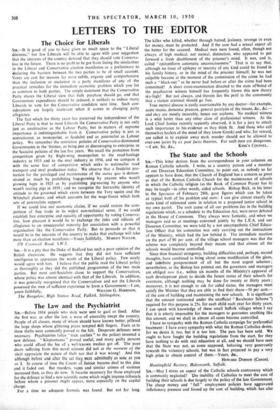LETTERS TO THE EDITOR
The Choice for Liberals sm,--It is good of you to have given so much space to the "Liberal dilemma," but few Liberals will be able to agree With your suggestion that the interests of the country demand that they should vote Conserva- tive in the future. There is no profit to be got from listing the similarities in the Liberal and Conservative election manifestos as a preliminary to declaring the barriers between the two parties to be of small account. Votes are cast for reasons far more subtle, organic and comprehensive than the inclusion or exclusion in a party manifesto of any of the practical remedies for the immediate economic problem which you list as common to both parties. The simple statement that the Conservative Party shares the Liberal view that bulk purchase should go, and that Government expenditure should be reduced, is unlikely to induce many Liberals to vote for the Conservative candidate next time. Such con- siderations are largely irrelevant when it comes to changing party allegiance.
The fact which for thirty years has preserved the independence of the Liberal Party is that to most Liberals the Conservative Party is not only just as unattractive as the Labour Party, but in matters of supreme importance is indistinguishable from it. Conservative policy is just as restrictionist, as monopolist, as feudalist and as paternalist as Labour policy. We remember the restrictive policies of Conservative-dominated Governments in the 'thirties, as being just as discouraging to enterprise as the Socialist policies of the last five years. We recall the protection from competition given by Right-wing monopolists to the road-haulage industry in 1933 and to the steel industry in 1934, and we compare it with the same fear of competition which seeks to nationalise road transport and steel production today.' We observe that a feudalist pro- tection for the privileged and maintenance of the status quo is demon- strated as much by prohibiting hap-growing by anyone who wasn't growing hops in 1925 as by prohibiting pig-rearing by anyone who wasn't rearing pigs in 1939; and we recognise the hierarchic identity of attitude to the governed which exists between the Tory squire and the Whitehall planner, and which accounts for the wage-freeze which both sets of paternalists support.
If we could lose our economic chains, if we could restore the com- petition of free trade in its widest non-technical sense, if we could establish free enterprise and equality of opportunity by voting Conserva- tive, how pleasant it would be to exchange the risks and ridicule of allegiance to an unsuccessful minority for association with a powerful organisation. like the Conservative Party. But to persuade us that it would be in the interests of the country to make that exchange will take more than an election manifesto.—Yours faithfully, MARGOT NAYLOR.
178 Cromwell Road, S.W.5.
SIR.—II is a pity that the Duke of Bedford has such a poor opinion of the British electorate. He suggests that they did not have sufficient intelligence to appreciate the worth of the Liberal policy. Few surely would agree with him. I believe that the public read the Liberal policy as thoroughly as they did the published programmes of the two main parties. But most anti-Socialists chose to support the Conservatives, whose policy was almost identical with that of the Liberals. In addition, it was generally recognised that the Conservatives and not the Liberals possessed the men of sufficient experience to form a Government.--A am,


































 Previous page
Previous page